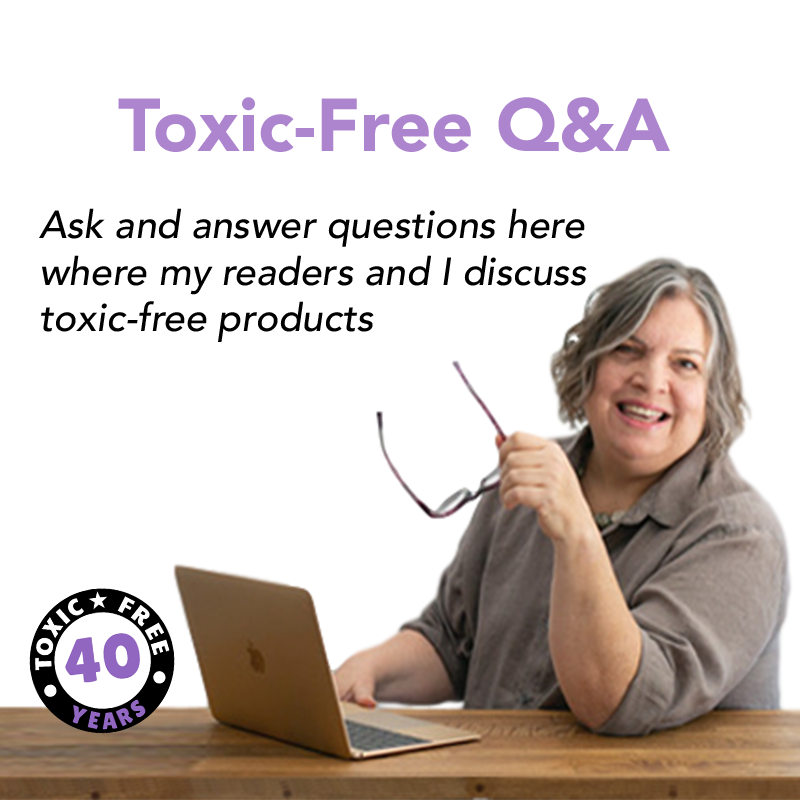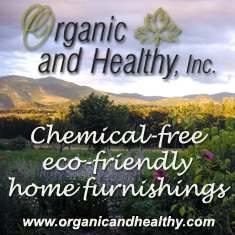
Submitted questions will be posted with my response by the following Tuesday or before.
Submitted comments will be moderated and approved within 24 hours.
Know of any Yurts without chemically treated sides and top?
Question from Beverly
Although we live in the country with pretty good air, seemingly healthy land, and a quiet environment(we used to live next to a freeway and much noise), we live in a toxic prefab home. Most every surface has chemicals or is synthetic. The toilets and sinks are the exception.
I was thinking that we could get a Yurt and sleep outside for that third of our life without chemicals, but every Yurt I looked up was polyester and vinyl, and treated with more chemicals. I am wondering if you or any readers are familiar with natural canvas yurts or with natural canvas tents and such and can refer me to a link or name of a business.
Beverly
Debra’s Answer
Readers?
What is spandex made from? Is it toxic?
Question from Beverly
Hi again,
What is spandex from, and is it toxic or offgassing?
I’m going through clothes, deciding what to keep and what to do without.
Thanks,
Beverly
Debra’s Answer
Spandex, also called lycra, is a synthetic fabric with a plastic base. It has the unique ability to expand up to 600% and spring back to the same size. Spandex is a polyurethane plastic, which is also used to make foam for furniture cushions and mattresses.
Spandex is used in bathing suits, cycling shorts, surgical compression garments, and brassieres, where its ability to wick moisture and stretch is is a benefit to the wearer.
But spandex can irritate sensitive skin, because it contains some harmful chemicals.
Pregnancy products
Question from GC
Hi Debra,
I love your site – it has such useful information!
I don’t know if this question has been asked already, but I was wondering if you could recommend some natural moisturizers to prevent stretch marks. I love Dr. Hauschka and some people have recommended the Buckthorn Oil from that line, but St.John’s Wort extract is listed as an ingredient and I’ve heard that that is not safe during pregnancy. Also along those lines, how safe would it be for me to continue to use Dr. Hauschka products (I know there are tons of herbs + essential oils in them) while I’m pregnant? Would rose oil products be a better alternative? (I have acne prone skin and I would like to use something natural — if not Dr. H, then something like rose oil to prevent blemishes).
I know natural is the way to go, but there is so little information out there about the potential dangers of some ingredients of natural products during pregnancy.
Thanks in advance!
Debra’s Answer
These are good questions. I know I have some readers who know more about herbals than I do, so let’s see what they have to say.
Organic Clothing
Question from Ethel
I’ve read your blogs on Organic Clothing and am still a little confused.
I am looking into baby clothing and accessories.I am seeing plenty of items made in China labeled organic in Toys-r-Us and TJ-Maxx. Are these trustworthy although they were made in China? I don’t see any certification on the items.
Also just to be clear buying 100% cotton and washing the items a few times is a safe second correct?
I’d like mention I appreciate all the advice I receive from you and all your readers!
Thanks Everyone!
I am wondering if you recommend organic clothing for infants/toddlers. I do buy my children mostly organic clothing, or at least try to dress them in 100% cotton. I shop at Hanna Andersson, although a lot of their clothing is not organic and is made in China. How important is organic clothing for children? What about adults?
I was looking for organic dancewear (I coudn’t find much of that) and I stumbled onto this:
I would really appreciate your input about the place.
Thanks.
Debra’s Answer
Again, non-organic cotton fabric has been lab tested in Germany and found not to contain pesticide residues. Still it is best to choose organic cotton when it is available and you can afford it because growing non-organic cotton puts pesticides into the environment, where we are exposed to them.
If a non-organic cotton item does not have a permanent press finish, you can wash it a few times and any temporary sizing finishes will come out.
Anything labeled “organic” should have a certification indicated on the label.
Rinse aid in dish washer
Question from Sadie
I use my dishwasher about once a week with natural products to clean, but not a rinse aid. The Ecover dishsoap tablets I recently bought recommend using one. I was wondering if I can use vinegar or if it would damage it. Any suggestions? I see Ecover makes one.
Debra’s Answer
I don’t have any personal experience with this, as I don’t have a dishwasher (actually, I do..his name is Larry).
Readers?
Personal air filters
Question from Joan Ablon
Dear Debra, Is there a personal air filter which can be hung around the neck and which you could recommend? A friend of mine got a Wein ionizer. Do you have a opinion of this? Thank you,
Debra’s Answer
I personally don’t have any experience with this.
Readers?
Plastic in shower heads
Question from L.A.
My shower head has soft rubbery plastic where the water comes out. I don’t know the correct terms, but it’s the face of the shower head including the little holes where the jets of water come out.
I use a good shower filter but wonder whether the water could be picking up any chemicals from the shower head’s plastic after going through the filter.
I like this shower head but would it be safer to replace it with a chromed brass one?
Debra’s Answer
I’m not worried about this. The water is moving by so fast that any amount of plastic that would get into it would be negligible.
Stymied re beds and sofa
Question from L.A.
All the natural beds and sofas sound wonderful, but all contain things that would be a problem for me. I have never noticed having a reaction of any type to synthetics like foam or polyester etc., but I’m trying to reduce toxic chemicals in my environment.
Wool makes me very itchy so I avoid it, and even if covered and not in contact with my skin, my area is prone to little bugs that gravitate to wool and silk (my building sprays – unfortunately – but even that doesn’t stop those little critters, and the thought of lots of bugs crawling in my bed is too unpleasant). I have developed a latex allergy. I have had bad reactions after eating soy for a very long time, and even reading newspaper made with soy inks seems to make my eyes burn badly, even though most fumes don’t bother me, so I’m leery of natural foams containing soy. I think I get skin reactions to organic cotton, though I’m fine with most smooth or flannel cottons as long as they don’t have stiff, itchy sizings.
I sleep on a 100% cotton futon (probably has fire retardant – I bought it used so don’t know), but it developed deep indentations where my body is so due to chronic back problems I have to put a (polyester fill) pillow lengthwise under my back, which defeats my trying to avoid breathing chemicals.
I don’t have a sofa and need one. Someone offered me a nice one that’s about ten years old or so and has hardly been used, but it contains urethane and I’m trying to keep chemicals out of my environement.
I am allergic to almost everything natural, unfortunately. Countless food allergies, and lifelong severe pollen allergies to trees, flowers, etc. Am I doomed to using synthetics, and if that’s the best option can I seal them off so I don’t poison myself with chemicals even though I don’t have any reactions while using them that I’m aware of? With a bad back (I’ve managed to avoid surgery on both back of neck and lower back), I really need to sit and lie on soft materials.
Thanks for any help you can give me!
I understand your dilemma. It’s important to keep in mind the difference between a reaction and a toxic exposure. Toxic exposures cause damage to the body, reactions are unpleasant, but the material isn’t toxic and is not damaging the body. In the long run it is better to be around nontoxic materials even if they cause reactions, as eventually your body will heal. You need to make your own decision. I know it’s a difficult one.
Debra’s Answer
I understand your dilemma. It’s important to keep in mind the difference between a reaction and a toxic exposure. Toxic exposures cause damage to the body, reactions are unpleasant, but the material isn’t toxic and is not damaging the body. In the long run it is better to be around nontoxic materials even if they cause reactions, as eventually your body will heal. You need to make your own decision. I know it’s a difficult one.
Baby Video Monitors and Infrared Light
Question from Mary
Hi Debra,
We recently purchased a video monitor for our baby. I really didn’t think much of it until my husband said that it emits infrared light shined on our baby so that it can see in dark/low light conditions. Is there any danger/risk to infrared light on our baby?
Debra’s Answer
Actually, infrared light has health BENEFITS. Search on “infrared light health effects” to find articles on this subject.
Permanent Press and Rayon
Question from YH
How do you know if a textile is permanent press or rayon? They seem similar to me. Does rayon emit formaldehyde?
Debra’s Answer
Permanent press is a finish and rayon is a fabric.
Rayon is made from natural cellulose and chemicals. It usually doesn’t have a formaldehyde finish. It is noted on the fabric content tag sewn into the garment.
That a fabric has a permanent press finish is usually stated on the label of cotton fabrics. However, all polyester/cotton blend fabrics have this finish and it is not on the label.







